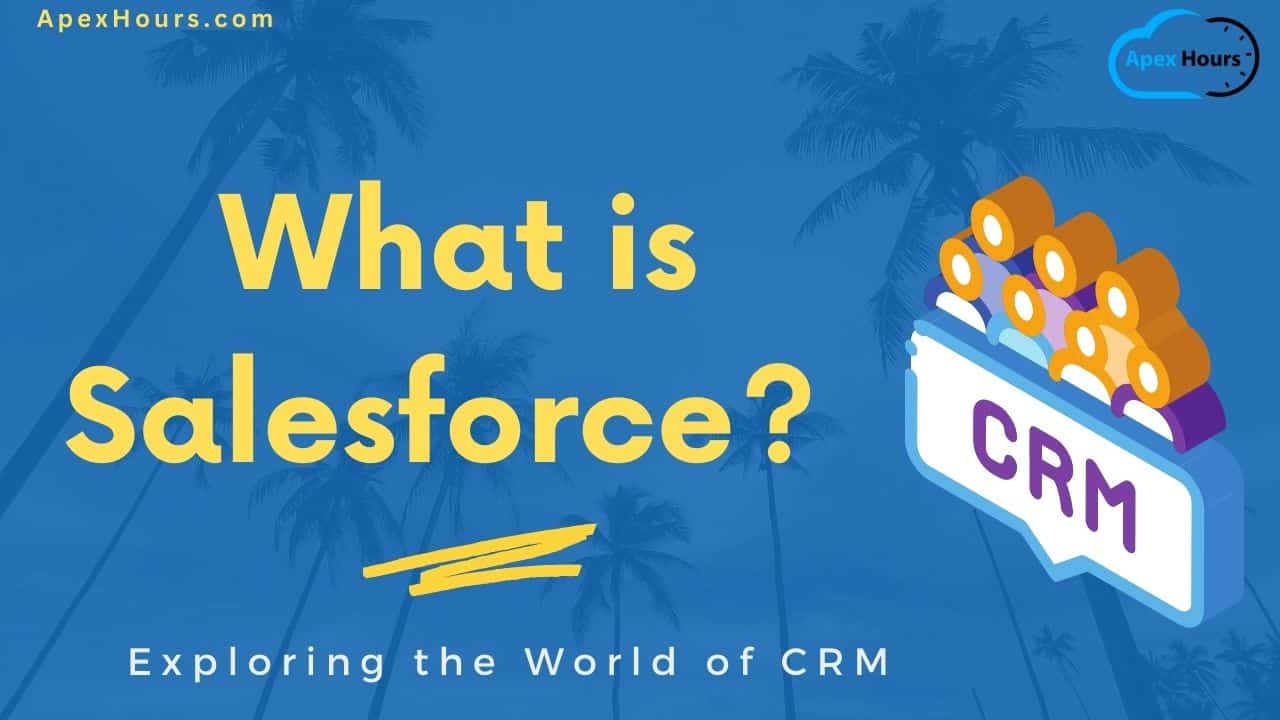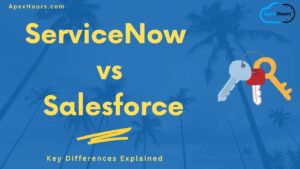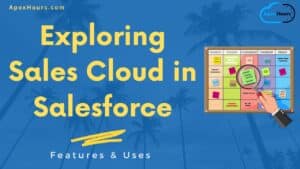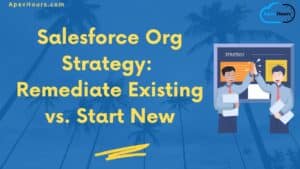Salesforce has redefined the CRM landscape, offering a cloud-based platform that not only streamlines customer relationship management but also enhances sales, marketing, and customer service through its innovative features. As a leader in the CRM space, Salesforce provides businesses with the tools necessary to foster deeper customer connections, automate key processes, and leverage data-driven insights for strategic decision-making. This article delves into the core features, transformative impact on sales dynamics, marketing strategies, customer experience, and the future trajectory of Salesforce CRM. Let’s learn about What is Salesforce? Exploring the World of CRM.
What is Salesforce?
Salesforce is a cloud-based customer relationship management (CRM) platform that helps businesses manage their relationships with customers, leads, and prospects. It integrates with various software applications, including ERP systems, marketing automation platforms, and e-commerce platforms.
Learn about Salesforce vs. HubSpot vs. Zoho CRM.
Understanding Salesforce’s Core Features
Let’s look at Salesforce’s core features.

Customer 360 – A Unified Customer View
I’ve come to realize that the heart of effective customer relationship management lies in truly understanding the customer. Salesforce’s Customer 360 offers just that—a unified, holistic view of each customer. This comprehensive perspective is crucial for crafting personalized and targeted sales strategies.
- Centralized access to customer data, including social media activity and preferences, allows for more personalized interactions.
- By leveraging this information, I can anticipate customer needs and tailor my approach accordingly.
With Customer 360, I’m not just looking at data; I’m gaining insights that transform how I connect with customers, making every interaction more meaningful.
The ability to automate routine tasks such as lead nurturing and follow-ups frees up my time to focus on what truly matters—building relationships. It’s not just about selling; it’s about creating value for customers at every touchpoint.
Sales Automation and Efficiency
In my journey with Salesforce, I’ve discovered that one of its most compelling features is the ability to automate sales processes. Automation is the heartbeat of efficiency, ensuring that no customer inquiry goes unanswered and every sales opportunity is maximized. By setting up custom triggers, I can advance prospects through the sales cycle without delay, responding to their needs at just the right moment.
- Automate Repetitive Tasks: Tasks like updating customer records and sending out emails are handled seamlessly, allowing me to focus on relationship-building and strategic selling.
- Centralized Data Management: With Salesforce, I’ve integrated other business tools, which has eradicated data silos and centralized all customer information, making it easily accessible when needed.
Embracing Salesforce’s automation has not only improved my efficiency but has also empowered me to deliver personalized experiences at scale. This has been a game-changer in managing my sales pipeline and boosting productivity.
The beauty of Salesforce lies in its ability to adapt to the fast-paced nature of sales. By leveraging customer intent and engagement data, I receive timely notifications that tell me the optimal moment to reach out to a prospect. This proactive approach has significantly reduced churn and transformed the way I engage with customers.
Integration with Other Platforms
One of the most powerful aspects of Salesforce is its ability to integrate seamlessly with a multitude of other platforms. This integration is key to maintaining a centralized workflow and ensuring that all customer data is synchronized across various systems. By eliminating data silos, Salesforce provides a unified view of customer interactions, regardless of where they take place.
- API integration with third-party applications, like ERP systems or email service providers, automates data syncing.
- Pre-built integrations and custom code options allow for a tailored CRM ecosystem.
- Compatibility with existing business systems is crucial for successful integration, ensuring seamless data flow and reducing errors.
The integration capabilities of Salesforce extend beyond mere data sharing. They empower sales teams with real-time access to customer data, directly from their CRM platform, which is essential for personalizing communications and enhancing customer engagement. With the ever-evolving landscape of digital tools, Salesforce’s commitment to integration positions it as a central hub for all customer-related activities.
Salesforce CRM: Transforming Sales Dynamics
Empowering Sales Teams with Advanced Tools
As I delve into the capabilities of Salesforce CRM, I’m struck by the sheer power of the tools at my disposal. Einstein Analytics stands out as a beacon of innovation, transforming raw data into predictive insights that guide my every move. With it, I can prioritize leads with precision, ensuring that my efforts are always targeted and effective.
- Enhanced Collaboration: Quip has been a game-changer, fostering seamless communication within my team and ensuring that we’re all marching to the beat of the same strategic drum.
- Data-Driven Decision-Making: The insights gleaned from tools like Einstein Analytics embolden us to make decisions rooted in data, not just gut feelings.
Embracing these advanced tools within Salesforce CRM has catapulted my team’s efficiency to new heights. We’ve automated the mundane, freeing up precious time to forge stronger relationships and seal more deals. It’s clear that businesses like mine, which harness these innovations, are the ones shaping the future of sales, poised for sustainable growth in a competitive landscape.
Predictive Analytics and Decision Making
I’ve come to realize that the true power of Salesforce lies in its predictive analytics capabilities. By analyzing past data and customer interactions, Salesforce provides me with foresight into customer behaviors and market trends. This predictive edge allows for more strategic decision-making, ensuring that my sales efforts are not just reactive, but proactive and informed.
- Advanced analytics and machine learning algorithms are at the core of this predictive prowess.
- The ability to segment audiences and target high-value prospects is enhanced by predictive insights.
- Customizing marketing campaigns to individual needs becomes more accurate with historical data analysis.
The strategic advantage gained through predictive analytics is undeniable. It’s like having a crystal ball that guides my marketing and sales strategies, allowing me to stay one step ahead of the competition.
Trend prediction is another aspect where Salesforce excels. It enables me to compare historical sales data with current market conditions, providing a clear picture of purchasing behaviors and the velocity of market trends. With this knowledge, I can tailor my approach to meet the evolving demands of my customers, ensuring that my message is always relevant and timely.
The Role of AI in Salesforce’s Evolution
As I’ve delved into the capabilities of Salesforce AI, it’s clear that the platform’s evolution is tightly interwoven with the advancements in artificial intelligence. Salesforce’s AI, particularly Einstein Analytics, is revolutionizing how we approach sales and customer engagement. The platform’s AI-driven features, such as predictive analytics and automated workflows, are not just futuristic concepts but daily tools that enhance our productivity and decision-making processes.
- Salesforce AI evolves with the generative AI landscape, offering frequent updates on new AI features.
- Generative AI in Salesforce increases automation, workflow management, and data analytics.
- Salesforce Copilot exemplifies AI’s role in improving both internal taskwork and external user experiences.
The integration of AI into Salesforce has transformed it from a mere CRM tool into a comprehensive assistant that supports every aspect of customer relationship management. The future promises even more sophisticated AI integrations, potentially incorporating augmented and virtual reality to create immersive sales experiences. As we navigate this AI-augmented landscape, staying informed and adaptable will be key to leveraging Salesforce’s full potential.
Marketing with Salesforce: A New Era of Engagement
Exploring the Salesforce Marketing Cloud
As I delve into the Salesforce Marketing Cloud, I’m struck by its robust capabilities tailored for marketers. This platform is a game-changer, enabling the creation and management of intricate marketing relationships and campaigns with ease. It’s a comprehensive ecosystem that revolutionizes how we connect with customers.
- The platform offers extensive customization options, catering to a diverse range of industries.
- It empowers marketers to launch tailored campaigns that enhance consumer engagement and drive sales.
- The ability to foster brand loyalty through personalized interactions is a significant advantage.
The Salesforce Marketing Cloud stands out as a potent tool for companies aiming to understand and interact with their potential customers more effectively. With its limitless opportunities, businesses can offer precisely what their customers desire, ensuring a more profound connection.
The real-world applications of this platform are vast, spanning across retail, eCommerce, financial services, healthcare, hospitality, and manufacturing. Each sector benefits from the Marketing Cloud’s ability to address unique business needs, making it an indispensable part of the modern digital marketing landscape.
Personalized Campaigns and Customer Journeys
I’ve discovered that the true power of Salesforce lies in its ability to create deeply personalized campaigns that resonate with each individual customer. By leveraging Journey Builder, I can orchestrate unique customer journeys across multiple channels, ensuring that every interaction is tailored and timely.
- Utilize real-time signals from customer behavior to refresh messaging and offers.
- Connect CRM data with engagement data for dynamic personalization.
- Analyze audience performance and optimize marketing spend.
The automation of welcome emails, abandoned cart alerts, and post-purchase follow-ups has revolutionized how I approach email marketing. With Salesforce Marketing Cloud, I can track the effectiveness of these campaigns in real-time, adjust strategies on the fly, and ultimately, drive a higher return on investment.
The goal is not just to reach out to customers but to engage with them in a way that feels personal and relevant. This approach not only fosters loyalty but also transforms the customer experience into something truly exceptional.
Cross-Industry Use Cases of Salesforce Marketing Cloud
The versatility of Salesforce Marketing Cloud is evident in its widespread adoption across various industries. Retail and eCommerce businesses leverage it to personalize shopping experiences and streamline digital campaigns. In the financial services sector, it’s instrumental in managing customer portfolios and delivering tailored financial advice. Healthcare organizations use it to maintain patient engagement and compliance, while the hospitality industry enhances guest experiences through targeted offers and services.
- Retail and eCommerce: Enhancing customer experience with personalized content.
- Financial Services: Delivering customized financial solutions and advice.
- Healthcare: Engaging patients with tailored health programs.
- Hospitality: Creating memorable guest experiences with targeted promotions.
- Manufacturing: Streamlining supply chain communications and customer service.
The Salesforce Marketing Cloud stands as a beacon of innovation, enabling businesses to not only meet but exceed customer expectations. Its ability to adapt to different industry needs makes it a crucial tool for any company looking to thrive in the digital age.
Each industry faces unique challenges, and Salesforce Marketing Cloud rises to the occasion by providing specialized solutions. For instance, in manufacturing, it aids in improving supply chain communication and enhancing customer service. The common thread across all these applications is the drive to deliver exceptional customer experiences, foster loyalty, and ultimately drive business growth.
Salesforce’s Impact on Customer Experience
Building a Customer-Obsessed Strategy
In my journey to create a customer-centric environment, I’ve learned that the key to success lies in truly understanding the customer. By leveraging Salesforce CRM, I’ve been able to gain deep insights into customer behaviors and preferences, which has been instrumental in crafting personalized experiences.
- Accelerate customer onboarding by triggering personalized journeys.
- Optimize service operations to proactively address customer needs.
- Utilize advanced segmentation tools to identify and cater to high-value customers.
The adoption of a customer-obsessed strategy isn’t just about using the right tools; it’s about fostering a culture that prioritizes the customer at every turn. With Salesforce, I’ve been able to transform data into actionable strategies that resonate with customers on a personal level, driving engagement and loyalty.
The result has been a noticeable increase in customer satisfaction and profitability. By customizing loyalty programs and offers, I’ve encouraged customers to engage more deeply with the brand, leading to enhanced brand awareness and a higher conversion rate.
Leveraging Market Insights for Enhanced Interactions
In my journey with Salesforce, I’ve learned that the true power lies in its ability to leverage market insights for enhanced customer interactions. By harnessing data-driven insights and progressive analytics, I can understand customer preferences and behaviors in a way that was previously unimaginable. This enables me to deliver the right message at the perfect moment, significantly improving engagement rates.
- Enterprises can identify high-value customers and tailor marketing strategies to meet their unique needs.
- Personalized loyalty programs encourage interaction, driving brand awareness and conversion rates.
- An integrated data approach empowers teams with valuable insights, enhancing the accuracy of customer data.
The synergy between customer intent data and timely sales team notifications has been a game-changer. It’s not just about having the data; it’s about using it to trigger the right actions at the right time, reducing churn and boosting seller productivity.
Case Studies: Success Stories with Salesforce
Throughout my exploration of Salesforce, I’ve encountered numerous success stories that highlight the platform’s transformative impact. One standout example is IBM, which leveraged Salesforce to unify client, partner, and employee experiences on a single platform, streamlining operations and enhancing collaboration.
Another inspiring case is the Health Services Executive in Ireland. Faced with the urgent need to deploy a COVID vaccination platform, they collaborated with Salesforce and IBM to launch the system in just two weeks, demonstrating the agility and scalability of Salesforce solutions.
The versatility of Salesforce is further evidenced by its widespread adoption across industries. Retail, healthcare, hospitality, and manufacturing sectors have all harnessed the power of Salesforce to connect with customers and personalize their experiences.
These case studies are just the tip of the iceberg. They serve as a testament to the fact that, regardless of the industry or challenge, Salesforce provides the tools necessary to innovate and excel in today’s competitive landscape.
Navigating the Future with Salesforce CRM
Staying Ahead in a Competitive Sales Landscape
In my journey with Salesforce CRM, I’ve learned that staying ahead in the competitive sales landscape is not just about adapting to change—it’s about leading it. Salesforce’s continuous innovation ensures that I’m always equipped with the latest tools and techniques to navigate the complexities of modern sales environments with agility and precision.
- Predictive analytics help me anticipate customer needs and focus on the most promising leads.
- Collaborative platforms enable my team to work together seamlessly, regardless of location.
- Mobile sales enablement allows me to be productive on the go, ensuring that no opportunity is missed.
Embracing these innovations is not just a strategic move; it’s a commitment to growth and success in an ever-evolving marketplace. As I continue to harness the power of Salesforce CRM, I am not just witnessing the sales revolution—I am actively participating in it.
Salesforce’s Continuous Innovation and Upgrades
As I delve deeper into the Salesforce ecosystem, I’m continually amazed by its relentless pursuit of innovation. Salesforce CRM is not just keeping pace with the evolving sales landscape; it’s actively shaping it. With each update, Salesforce introduces new features that redefine how businesses interact with their customers and manage their sales processes.
- Generative artificial intelligence is enhancing Salesforce’s native automation and workflow management.
- Predictive analytics are becoming more sophisticated, allowing for more accurate forecasting and decision-making.
- Salesforce Copilot is revolutionizing the way users manage outreach and analysis, improving both internal and external user experiences.
The introduction of AI-powered features like Einstein is a testament to Salesforce’s commitment to staying at the cutting edge of technology. These advancements are not just incremental; they are transformative, enabling businesses to operate with unprecedented efficiency and intelligence.
Salesforce’s updates are frequent, sometimes occurring on a daily or weekly basis, ensuring that users have access to the latest tools and techniques. This commitment to continuous improvement is what keeps Salesforce at the forefront of the CRM industry, and it’s why I’m confident that embracing these innovations is key to staying competitive in today’s fast-paced sales environment.
Preparing for the Sales Revolution with CRM Tools
As I delve deeper into the capabilities of Salesforce CRM, I’m struck by the realization that we’re on the cusp of a sales revolution. Embracing the latest tools and techniques is not just an option; it’s a necessity for staying competitive.
- Understanding and leveraging predictive analytics
- Utilizing collaborative platforms for team synergy
- Harnessing the power of AI for smarter sales strategies
The journey towards sales excellence is continuous, and Salesforce CRM is the compass guiding us through this ever-evolving landscape. With each new feature and integration, the platform becomes an even more indispensable ally.
I’m committed to not just witnessing this transformation but actively participating in it. By keeping abreast of Salesforce’s continuous innovations and upgrades, I’m preparing myself and my team for the challenges and opportunities that lie ahead. The future of sales is here, and with the right CRM tools, we’re ready to lead the charge.
Frequently Asked Questions
Salesforce is a cloud-based customer relationship management (CRM) platform that helps businesses manage their relationships with customers, leads, and prospects. It integrates with various software applications, including ERP systems, marketing automation platforms, and e-commerce platforms.
Salesforce provides a suite of tools across sales, marketing, service, and commerce to help companies connect with their customers. It offers a unified customer view, sales automation, predictive analytics, and AI-powered features to support relationship management and decision-making.
Key features of Salesforce CRM include a 360-degree customer view, sales automation, predictive analytics, AI-powered insights, and integration with other platforms. These features enable personalized sales strategies and streamline repetitive tasks for sales professionals.
Salesforce CRM introduces advanced tools and techniques like predictive analytics and collaborative platforms that revolutionize the sales landscape. It empowers businesses to navigate sales complexities with agility and precision, positioning them for growth in a competitive market.
Salesforce Marketing Cloud is a CRM platform for marketers to create and manage marketing relationships and campaigns with customers. It offers tools for personalized campaigns, customer journey management, and leverages cloud computing to provide a competitive edge in digital marketing.
Salesforce impacts customer experience by providing a customer-obsessed strategy, leveraging market insights, and offering a holistic view of customer interactions. It enables businesses to build personalized and targeted sales strategies, enhancing customer interactions and satisfaction.
Conclusion
In conclusion, Salesforce has established itself as an indispensable cloud-based CRM platform, revolutionizing how businesses manage customer relationships and drive sales. Its comprehensive suite of tools and services, including the Sales Cloud, Marketing Cloud, and the innovative use of AI through Einstein, provides a 360-degree view of the customer, enabling personalized and efficient interactions. Salesforce’s ability to integrate with various software applications and its focus on automation and predictive analytics empowers organizations to stay ahead in a competitive marketplace. As we’ve explored the diverse applications and benefits of Salesforce, it’s clear that this platform is not just a CRM solution but a game-changer for sales teams and marketers alike, fostering customer-centric strategies and driving the future of sales and marketing in the digital age.
Author Details
Gobinath A
Co-Founder & Chief Marketing Officer




